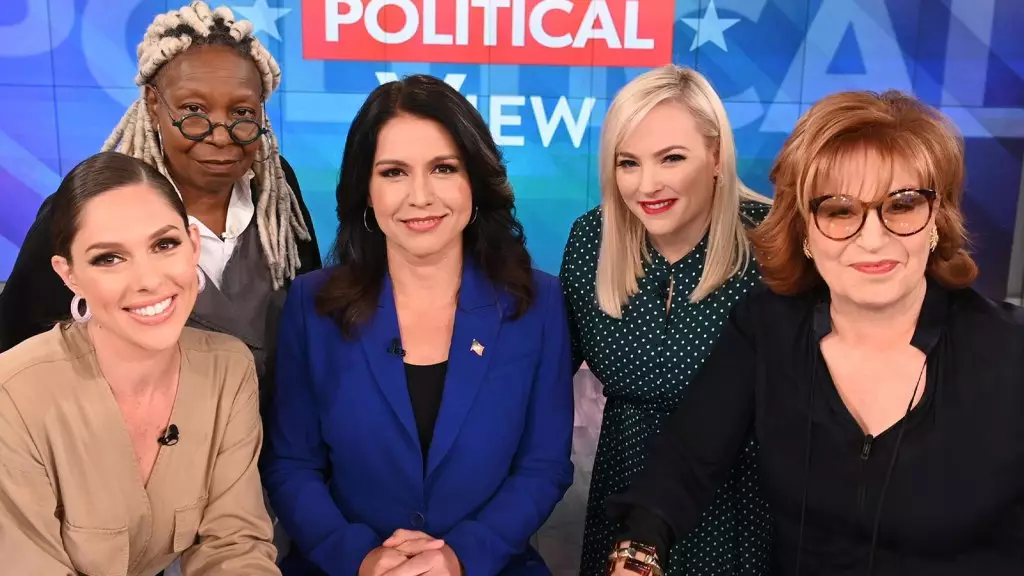Meghan McCain’s departure from the table of “The View” has not only sparked a range of opinions but also left a trail of reflections on high-stakes television and the dynamics of political discourse. Her recent appearance alongside Tulsi Gabbard at the Stand with Women event in Philadelphia served as an opportunity to delve into the nuances of their friendship, the political climate, and the realities of female camaraderie in the often cutthroat world of daytime talk shows.
The relationship that has blossomed between McCain and Gabbard is far from conventional. Once adversaries on the small screen, their friendship is now characterized by mutual respect and a shared understanding of the challenges they both faced within the media landscape. During their time together on “The View,” both women emerged as targets amid the chaos of opinionated discourse. McCain’s candid remarks about her former co-hosts reflect a sense of betrayal and an awakening to a more profound camaraderie with Gabbard. Her recollections of Gabbard’s appearance upon the show reveal the contrasting energies at play: while Gabbard was articulating her ideas, McCain felt compelled to mount a defense against her fellow panelists, whom she felt acted more like “vultures” than colleagues.
This sentiment echoes a sentiment that many women grapple with in competitive environments, where loyalty is often overshadowed by rivalry. McCain’s ability to lean on Gabbard during these moments illustrates a vital aspect of their relationship: shared experiences in hostile environments can transform acquaintances into allies. The bond they formed was not merely an offshoot of their shared political beliefs but a necessity borne out of the need for solidarity in an environment that often prized sensationalism over substance.
McCain’s criticism of her former co-hosts raises questions about the workplace dynamics that characterize daytime television. Her memories of Gabbard’s spirited defense against Joy Behar showcase the fierce battles that can occur when political divides are publicly aired. The highs and lows of these engagements are not merely fodder for entertainment; they reflect broader societal issues surrounding women in leadership, especially in politics.
Interestingly, McCain’s allegations of feeling ostracized also point to a systemic pattern of interaction among women in media. Her decision to remain friends with production staff rather than her co-hosts speaks volumes about the pressures of maintaining relationships in a hostile environment. The fear of backlash for simply being associated with her may hint at an unspoken rule that exists within these spheres—while women are encouraged to support one another, the reality often diverges from the ideal.
Post-“View,” McCain’s remarks offer a scathing critique of her experience on the show, labeling it a “rigged show” and describing her former co-hosts disparagingly. This evolution from co-host to critic necessitates a broader examination of how reality television impacts the mental and emotional wellbeing of participants. McCain’s choice to sever ties with her former colleagues illustrates a desire to distance herself from a painful legacy while highlighting the importance of mental health in media careers.
As McCain expressed her firm stance against ever returning to the show, it raises intriguing points about the implications of her tenure on her future endeavors. Her comment about “these women will never quit me” is emblematic of both a fierce independence and the lingering shadow of her past experiences. Additionally, her deliberate choice to protect the identities of her remaining friends at “The View” implies a lingering sense of vulnerability, revealing the emotional scars that can linger long after one leaves a contentious environment.
Navigating the choppy waters of reputation and rivalry, Meghan McCain has forged a new path alongside Tulsi Gabbard that empowers her voice in a world that can often feel dismissive of independent thought. Their friendship signifies a counter-narrative to the often divisive politics of media—one that champions solidarity over hostilities. As post-traditional media continues to evolve, the lessons drawn from their experiences underscore the need for authenticity, resilience, and the courage to voice truths, underscoring that even in disarray, new friendships can manifest while old wounds may yet heal.

